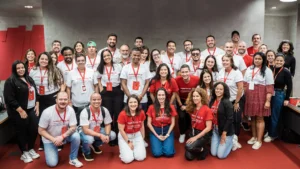By Gustavo Vitti, Vice President of People and Sustainability at iFood
When people ask me what guides people management at iFood, I always answer that it is genuineness. We are very truthful with people here, with transparency, dialogue and context – everything so that everyone is always aware of our actions and intentions.
The objective is to have a healthy exchange: to give back to these people, whether in career, development, opportunities or remuneration, as much as they contribute here by contributing to innovations, the growth of iFood, their appetite for risk. From the beginning, we have a real interest in taking care of these people so that they feel welcomed.
This is where people management in the New Economy differentiates itself, as companies focus on solutions that benefit the entire ecosystem – employees, community and society.
At iFood, we focus on the solution we offer (delivery), the positive impact it brings and on people. Before defining which fronts we would act on, we had several conversations to understand what the employees' pain points were and what they perceived about society.
We listened to a lot of people until we arrived at what we today call EMI (our ESG): Education, Environment and Inclusion. These are the three pillars that guide our actions to give back to our society and the country so that they become even better.
Regarding Education, our collaborators have a very strong opinion: only through it is it possible to make revolutions and transformative developments in our country. As a large technology company, our goal is for more and more people to stop looking at technology and saying “this isn’t for me” and start saying “how do I get there?”. iFood wants to open this door so that these people feel welcome.
We know that, currently, the highest salaries on the market are in this area. If we manage to take this learning to the periphery, for those who believe they do not have access, this could mean the biggest socio-digital revolution that Brazil has ever seen – and, with this, we will be able to transform the nation into a true power.
In the Environment, we work to return much more than we consume in natural resources. Today, iFood has more than 200 thousand delivery partners on the platform, and we encourage them to adopt non-polluting modes, with programs such as iFood Pedal, sharing traditional and electric bicycles.
Still in the environment, we are innovating by finding alternatives to plastic packaging and promoting initiatives so that this type of packaging is recycled or its use is reduced.
When we go to Inclusion, we talk about a generation that does not want to leave anyone behind and we know the need to correct historical debts. It is also the role of companies to provide access to all people who, in the past, did not have opportunities.
Another very important topic for us is food security. As our business is based on people's relationship with food, why not make sure that food also reaches those who need it most?
We have carried out several actions in this regard: urban gardens on the outskirts, surplus food donation projects and an in-app donation platform. Today, iFood is already one of the largest fundraisers for donations for social causes, especially in relation to food and food insecurity.
When people ask me how to identify “what your cause is”, I ask the question back: what can your company do better than anyone else? In our case, as we deal a lot with technology, we are able to be a bridge between the outskirts and the more upscale areas of the city, bringing technology learning and education to these areas.
It is also essential to understand which companies you want to join, to have an increasingly greater impact. At iFood, we say that we will not — nor do we want — solve all these problems alone. It is necessary to leave the ego aside and understand that these actions are increasingly collective.
And you, do you want to join us in fueling the future of the world?


